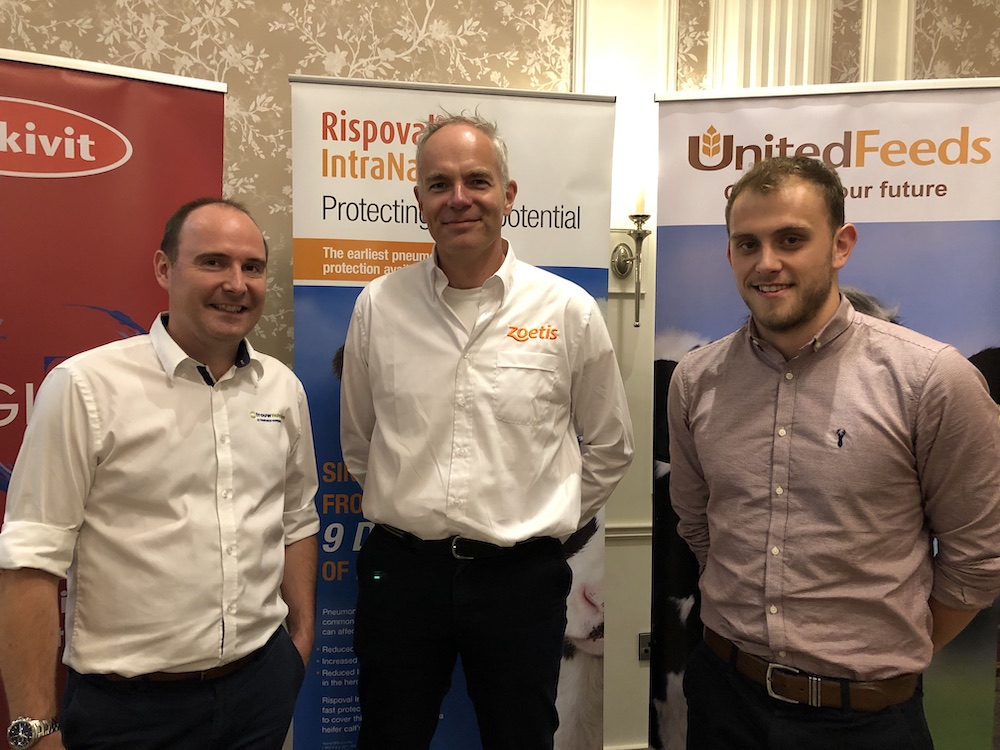Index
Meetings/Seminars
The Vital Role Of Calf Health
 The effects of calf housing, disease and nutrition on profit margins and the future performance of the dairy herd were outlined at a series of Calf Health Seminars throughout Northern Ireland, organised by Zoetis and Trouw Nutrition with support from United Feeds.
The effects of calf housing, disease and nutrition on profit margins and the future performance of the dairy herd were outlined at a series of Calf Health Seminars throughout Northern Ireland, organised by Zoetis and Trouw Nutrition with support from United Feeds.
Calf Housing
Aaron Brown, a first year PhD student with AFBI/QUB is currently researching calf housing practices which optimise calf performance and health.
The Optihouse project is a DAERA and AgriSearch funded project to investigate the relationships between calf housing and management, rearing environment and pre-weaned calf health and performance.
During the spring of 2019, sixty-six Northern Ireland dairy farms were assessed with regard to calf rearing practices and housing/ environmental conditions. Calf house measurements, building materials, hygiene levels and ventilation ability were all assessed.
Initial results indicate a wide variation in housing design, management practices and hygiene levels. Many houses had sub-optimal ventilation and room for improvement in general hygiene. With an immature and developing immune system, high levels of hygiene are critical in young calves to reduce the risk of many diseases.
As the project continues, the impact of suggested changes in housing design/hygiene management will be assessed, and blueprints for calf house design will be produced by the end of the project.
New Tools in the Battle Against Pneumonia
Dr. Jan Van Dijk, Veterinary Consultant, Zoetis, informed the audience that on dairy farms, death rates in calves between 1 and 6 months may run as high as 29%. Animals surviving pneumonia can suffer stunted growth rates and therefore fail to calve down at 24 months of age.
In terms of pneumonia prevention, the importance of colostrum, 'passively immunising' the calf, has been stressed for many years. Vaccination also has a crucial role to play. Zoetis has a wide respiratory disease vaccine portfolio - which makes it possible to tailor the vaccine protocol to individual farms. In particular, the introduction of Rispoval IntraNasal® has been a game changer as it facilitates vaccination of calves as young as 9 days of age.
Launched earlier this year,CLARIFIDE Plus® is a simple genomic test predicting how an animal will perform in the herd. With reliabilities of up to 70%, it predicts not only what production levels can be expected but also how likely an animal is to suffer from common diseases, such as calf respiratory disease
This exciting new test can be used to select animals with a greater resilience to calf respiratory disease and breed these to be the future of the herd. Once the potential of a newborn animal is known, it becomes possible to choose which animals to keep at an early age.CLARIFIDE Plus is the only test on the market giving a prediction on the likelihood of specific diseases occurring.
Critical Window of Opportunity to Unlock the Full Potential of Calves
Dr. Mark Little, Technical Manager, Trouw Nutrition explained that LifeStart research has demonstrated that feeding calves elevated planes of nutrition has a significant impact on gene expression and positively influences an animal's metabolism, with the effects visible later in life. LifeStart resets the quantity of milk a calf needs.
Mark also explained that Milkivit Energizer has been specifically formulated to ensure that the calf receives a balanced nutrient supply for optimal development whilst supporting the health of the calf. The formula is closer to that of natural milk with 10% more metabolisable energy, with the difference in calf performance and health demonstrated on farms. Milkivit Energizer, which is available from United Feeds, resets the quality of milk a calf needs.
Northern Ireland Food Industry Poised To Supply All Markets
 Robust and effective quality controls in the agri food industry in Northern Ireland are key to providing access to new markets in addition to further developing and expanding existing outlets, Robin Irvine, Chairman of Northern Ireland Food Certification (NIFCC) announced at the annual general meeting.
Robust and effective quality controls in the agri food industry in Northern Ireland are key to providing access to new markets in addition to further developing and expanding existing outlets, Robin Irvine, Chairman of Northern Ireland Food Certification (NIFCC) announced at the annual general meeting.
He added "To maintain the momentum we have to continue to differentiate our products not only with high quality standards but the assurance that these standards are independently monitored and continually upgraded."
Commenting on areas of business development in the company's auditing service, Robin informed members that a major item of progress in 2019 will be the design and implementation of an electronic report writing tool for the British Retail Consortium (BRC) Food Safety Scheme audit reports. The principles of this system will be broadly similar to the system currently being used used for the farm-based assurance schemes, and the objectives will be to enhance the efficiency of the report writing process whilst also improving the consistency and accuracy of information.
He explained "This is an area of the business where we see opportunities for growth - the increase in the scale of the food processing sector in recent years has been remarkable and it is an area where NIFCC can further develop their business. We are keen to see NIFCC expand its activities throughout the Agri- Food supply chain and are committed to see the organisation develop."
A further development is the plan to strengthen the management team with the appointment of a Chief Executive to lead the organisation and build on the reputation and profile that NIFCC enjoys throughout the food chain.
NIFCC is a unique United Kingdom Accreditation Service (UKAS) certification body which is owned by the Northern Ireland agri-food industry, and operates on a "not for profit" basis with a remit to provide product certification schemes to the local agri-food industry at a competitive cost.
All aspects of the farming and food industries are represented on the board of NIFCC and they employ highly qualified independent professional people to inspect and maintain standards. Quality assurance which is independently verified, is putting the entire agri food chain in Northern Ireland at the leading edge of food safety.
In the food processing sector, NIFCC currently provides audit and certification services to the British Retail Consortium (BRC) Global Standard for Food Safety and the BRC Global Standard for Storage and Distribution. The company is also responsible for auditing services for a number of Red Tractor schemes including the Red Tractor Processing Scheme; Red Tractor Assurance Scheme for Livestock Transport and Livestock Markets and the Red Tractor Assurance Schemes for both dairy and poultry farms. Other Farm Quality Assurance schemes audited by NIFCC include Beef and Lamb, Cereals and Trade Assurance Scheme for Combinable crops.
Robin concluded "We are involved in monitoring and certification throughout the entire food chain from animal feed through to farm, transport, processing and storage.
"NIFCC is also continuing to provide training to the food industry for BRC Food Safety Standards. In the past year we have delivered ten training courses to 105 delegates, including our own auditing and certification staff.
Photography by Columba O'Hare
